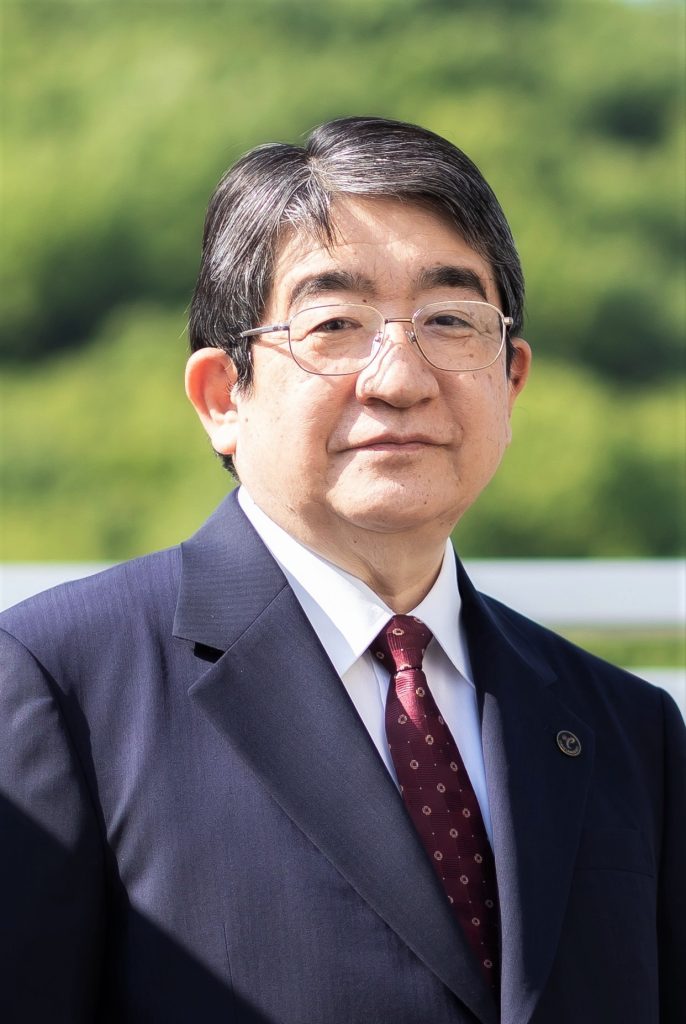Introduction of the president
message

Today, in addition to medium- and long-term issues such as the declining birthrate and resulting population decrease, and worsening global environmental problems, we are faced with essential and serious problems such as frequent and increasingly severe natural disasters and the risk of infectious diseases caused by various viruses. In addition, “values that the world was supposed to share” are being lost due to the invasion of Ukraine by Russia and other factors. In the future, humanity must take all possible measures to ensure the perpetuation of the human race and all living species on the planet.
Ehime University, as a national university based in the region, will contribute to regional development through a variety of initiatives, including participation in regional industrial innovation, creation of new industries through industry-academia-government-finance-private sector collaboration, recurrent/reskilling education for working people, development of digital human resources to promote regional DX, and revaluation and dissemination of regional culture, in addition to its basic university functions of producing talented young people and promoting academic research. We will contribute to regional development through a variety of initiatives, such as reevaluation and dissemination of regional culture. We are also working to reinvigorate student and research exchanges with other countries, which were stalled by the Corona disaster, and to promote SDGs, GX (Green Transformation), diversity, etc. We will also take on the challenge of creating new values, such as improving labor productivity and well-being, which will lead to reforms in the way people work. We will continue to take on the challenge of creating new values such as wellbeing.
The basic policy of Ehime University, as I see it, is to “contribute to building a sustainable and resilient regional society by promoting multifunctionality as a “regional center of knowledge” that is responsive to all generations. To this end, it is necessary for the university to promote diversity in its members and decision-making, to be sensitively aware of social changes and stakeholder expectations, and to take necessary measures in a timely manner.
In April 2024, the four existing “Institutes” that were responsible for university-wide functions were reorganized into six (Organization for Future Value Creation, Organization for Education and Student Support, Organization for Research and University-Industry Collaboration, Organization for Regional Collaboration, Organization for International Relations, and Institute for Digital Information Human Resource Development) and two institutes (Institute for Advanced Research and Innovation, and Institute for Innovation Innovation Creation). The newly established “Organization for Creation of Future Value The newly established “Organization for Future Value Creation” has the primary objective of discussing and creating “new values” in the mid-term future in advance of society and disseminating these values to society, in consideration of the fact that the university is an organization that handles “knowledge” in society. The Organization for the Promotion of Research and Industry-University Collaboration promotes Ehime University’s academic research, returns the results of that research to society, and creates a virtuous cycle for acquiring new research funding. The Organization for the Promotion of Regional Collaboration was established to promote collaboration with the local community and regional stakeholders by taking the initiative in solving administrative and regional issues by actively utilizing the results of Ehime University’s education and research in a wide range of academic fields, from the humanities to the sciences.
Finally, the following is a description of Ehime University’s “Goals” for the future. It is a bit long, but you can think of it as Ehime University’s “vision.
Ehime University, as a regional national university, aims to be a university that continues to make an impact on society by improving its capabilities for human resource development, research excellence, international collaboration, and regional cooperation. Specifically, Ehime University will cultivate the next generation of human resources with expertise in their respective academic fields and liberal arts skills that will lead to flexible ideas, while exploring the nature of society in the mid-term future when values will undergo a major transformation, and will demonstrate excellence in research that will lead to the creation of innovation. We will also promote the acceptance of international students, dispatch of students overseas, and international joint research that will lead to diversity; collaborate with stakeholders to increase the motivation of various generations to learn and revitalize local communities and industries; contribute to building a healthy society through the development of local medicine; and strengthen management capabilities through funds obtained by being recognized by society. We aim to become a leader of regional national universities in the 21st century, where all people can play an equally active role, by strengthening the
We sincerely appreciate your continued understanding and support of Ehime University and its various initiatives.
Hiroshige Nishina, President of Ehime University
profile
| Birthday | Born in 1954 |
| Degree | Doctor of Agriculture |
| Abbreviation history | Apr 1998 Professor, Faculty of Agriculture, Ehime University April 2011 Dean, Faculty of Agriculture, Ehime University (until March 2015) Apr. 2012 Director, Plant Factory Research Center, Ehime University (until Mar. 2020) Apr 2015 Executive Director and Vice President, Ehime University (until Mar 2021) October 2017 Member of Science Council of Japan (until September 2023) Apr. 2021 President, Ehime University |
| Specialized field | Agricultural environmental engineering, plant factory |

